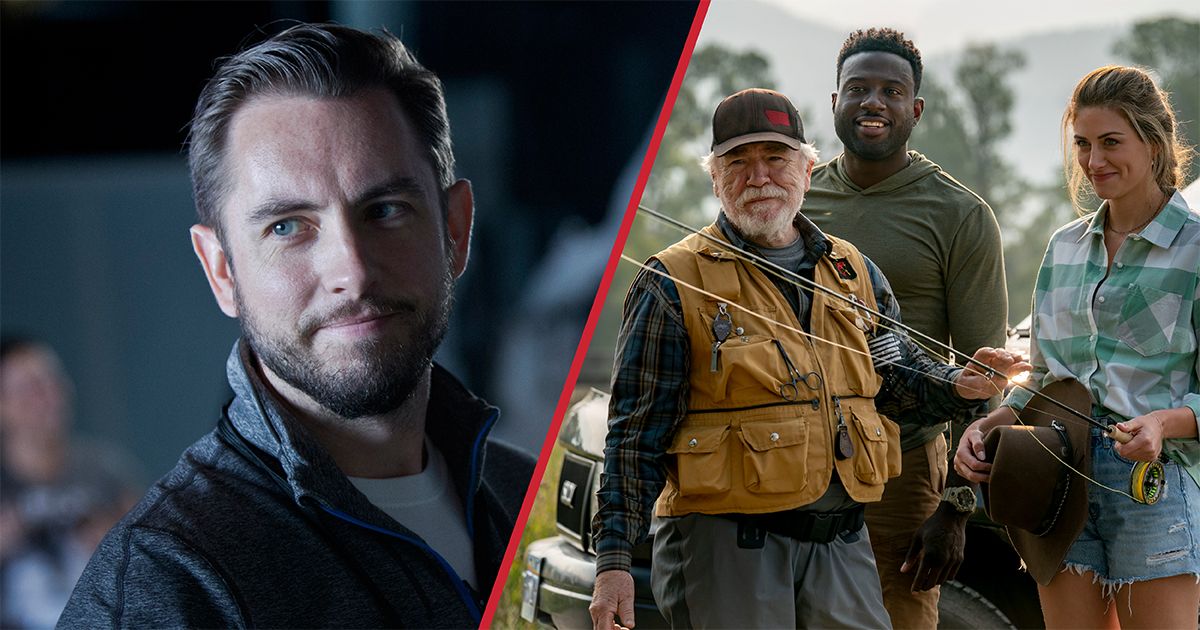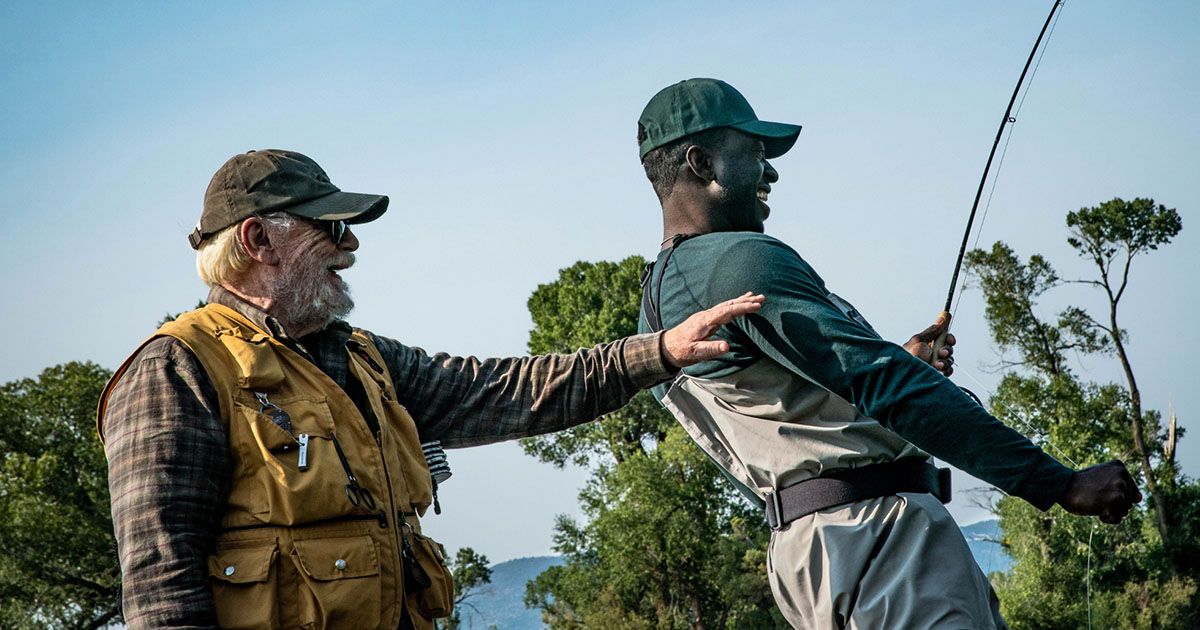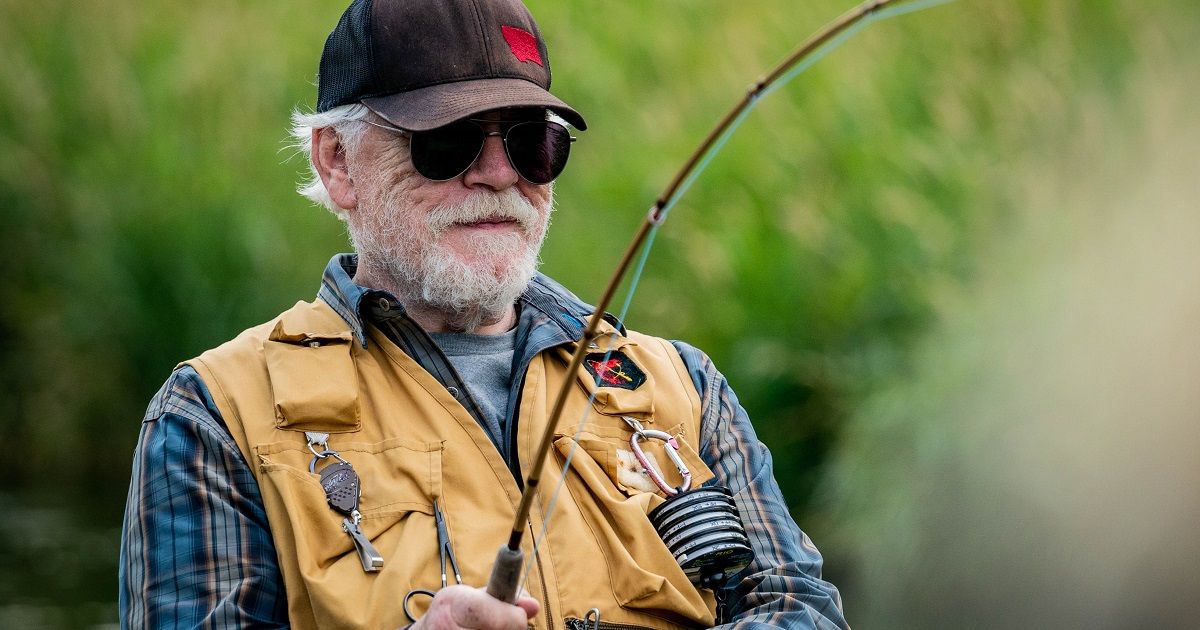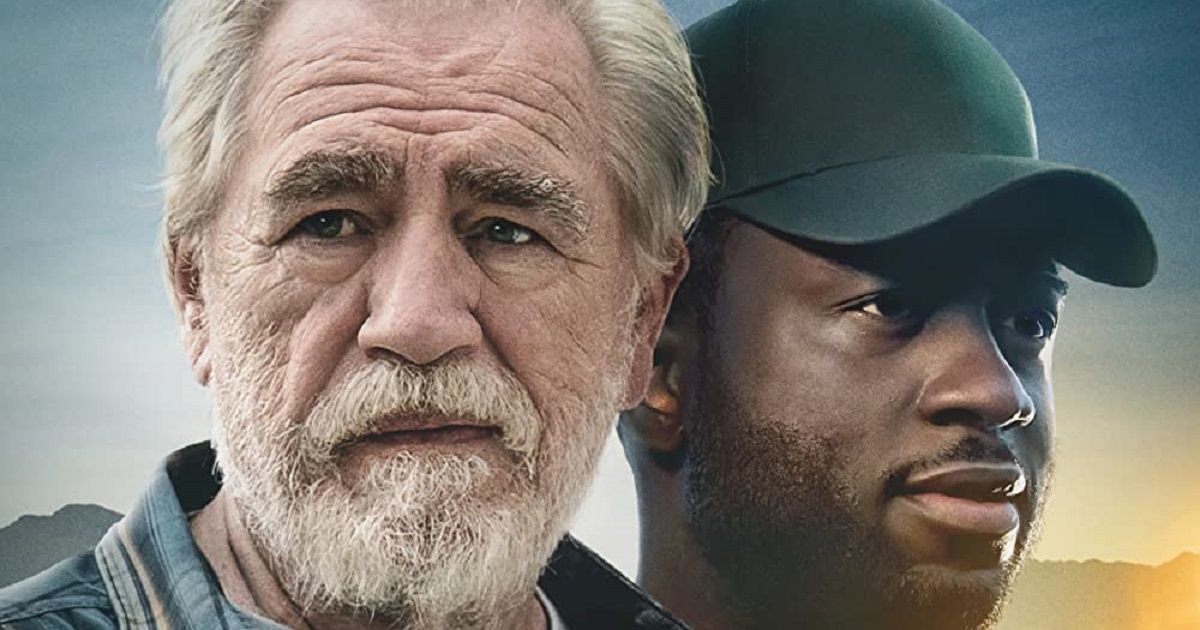"There's really one movie made about fly-fishing, which is A River Runs Through It," said Joshua Caldwell, the director behind the new film, Mending the Line. Is there an audience for fly-fishing films, though? Caldwell would argue that, while the idea is certainly grounded in the act and art of fly-fishing, the actual essence of the concept relates to peace and centered focus. A cinema of fly-fishing is a Zen cinema of the present moment. That's why Mending the Line is important.
The new film follows a Marine, John Colter (Sinqua Walls), who goes to Montana after enduring the horrors of modern war. He begins rehab therapy and psychological testing to see if he's fit to tour again, and is tasked with a new therapeutic method for veterans — fly-fishing. He joins a Vietnam War veteran with medical issues, Ike (Brian Cox), and neither one of them are particularly interested in spending time together, but they both end up finding a kind of peace and stillness through fly-fishing.
Caldwell spoke with MovieWeb about the film, in a way that was at one poetic and deeply self-aware. It was a meaningful, deeply thoughtful conversation, and indicates that Caldwell is a filmmaker of the highest order with a fascinating career ahead of him.
Veterans, Fly-Fishing, and Happenstance
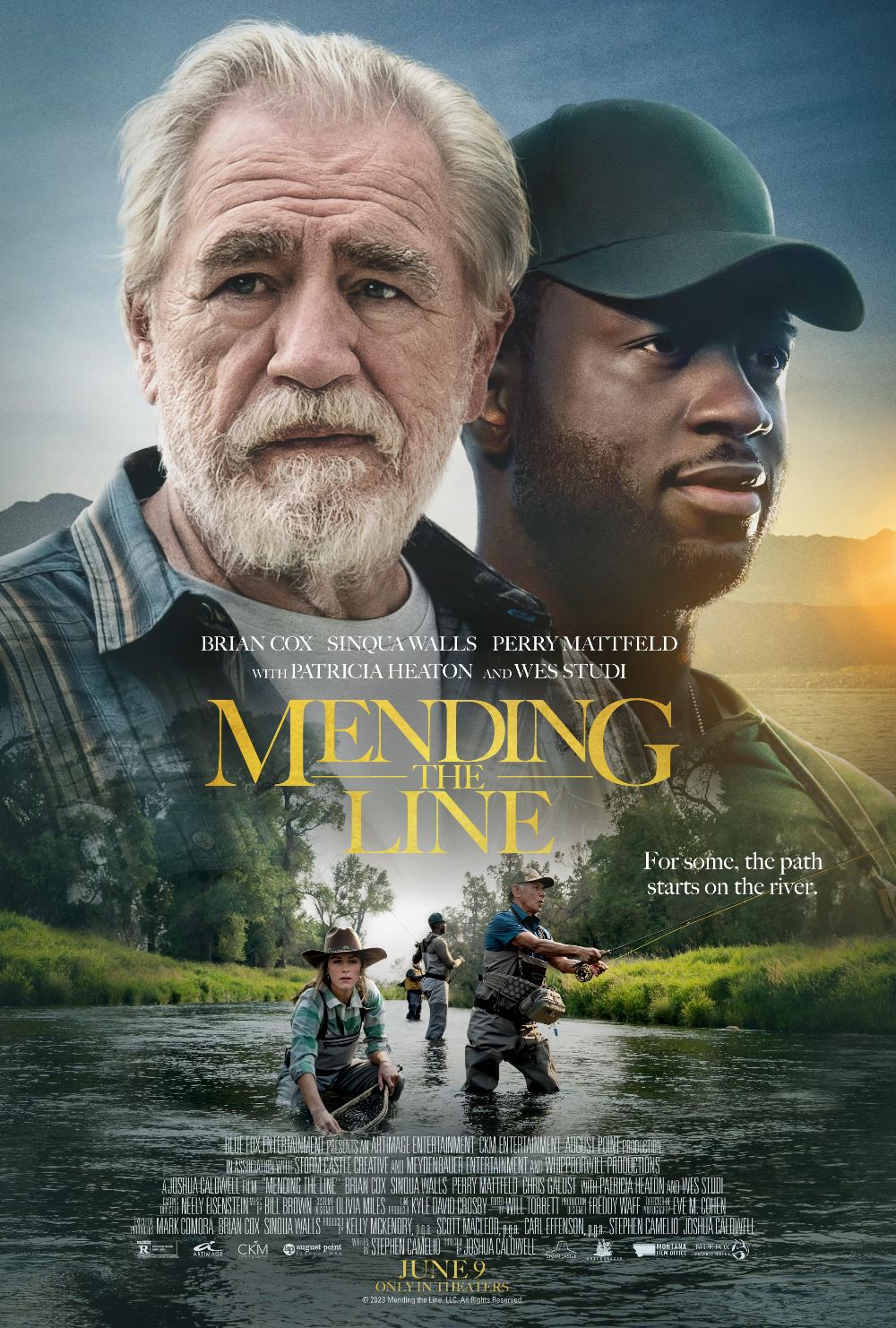
Mending the Line
- Release Date
- June 9, 2023
- Director
- Joshua Caldwell
- Cast
- Brian Cox , Sinqua Walls , Perry Mattfeld , Chris Galust , Patricia Heaton , Wes Studi
- Runtime
- 122 Minutes
- Writers
- Stephen Camelio
- Studio(s)
- ArtImage Entertainment , CKM Entertainment , August Point Productions , U.S. Marine Corps Entertainment & Media
- Distributor(s)
- Blue Fox Entertainment
Caldwell is an ardent practitioner and proponent of fly-fishing, so when a script related to the activity came across his desk (in a kind of universal happenstance), he jumped at it. "For me, having started fly-fishing about six years ago, and gotten really into it, it's become a major passion of mine," explained Caldwell. "The notion of bringing that passion into another passion of mine — that is, making movies — was definitely too good to pass up. And I really fought to be the director on it."
At the same time, Caldwell was also in the midst of researching PTSD, so the script for Mending the Line (from Stephen Camelio) was quite literally perfect for him. "The other big part of it was just the angle of PTSD and the military. I had been researching a lot of that stuff around PTSD and returning vets," continued Caldwell. He went on:
Here, in this script that I didn't come up with and I didn't write, was the merging of these two things that I was incredibly interested in, and he'd done it in such a beautiful way. Stephens' script was so beautifully written, and his portrayal of the veterans, his portrayal of Lucy and her mother-in-law, and the fly-fishing, was so on point. I was like, I've got to be a part of this somehow.
Joshua Caldwell and a Cinema of Subjectivity
While in person and in practice, Caldwell would seem the obvious candidate to helm Mending the Line, cinematically, he may seem a world away from the patient, compassionate, and quietly relaxing aesthetic of the film. His previous movies are primarily thrillers, one with an extreme amount of violence and darkness. So what did Caldwell really have to do with Mending the Line? How did it fit in with a previous filmography that couldn't be more different?
"I don't often really reflect too much on my own path," began Caldwell. "I think that, certainly as a young filmmaker, you make the movies you can, you don't necessarily have your pick of whatever's available. And so, I think that even if I had probably been making horror movies, I would have probably still made this movie, because again, it's the merging of those interests for me. But I do think it still fits into my filmography."
"I mean, my first movie was a drama. Negative is probably a little bit more drama than thriller," continued Caldwell. "You know, Infamous certainly has this sort of gonzo, in-your-face, highly stylistic approach, but I tend to base stuff on the material and what it's calling for. And even with Mending the Line, I think there's a version that could be very objective, a stepped back experience. But that's not the movie I made. I made what is a fairly subjective film." He explained, rather brilliantly:
"We take the audience on Colter's journey. So you're given this really chaotic opening that just thrusts you into it, and then you're immediately taken out of it, and you sort of go to Montana, and you're treated to this very peaceful rendering of Colter's process, and the audience's experience of this story mimics Colter's. So when Colter first sees Livingston, he sees it through the window of a van [...] but then after that you don't see another shot of mountains or rivers until halfway through the movie, when Colter first goes to the river. And that's when the world finally opens up to him.
"The first half of the movie is fairly claustrophobic because Colter is claustrophobic. He is not seeing the beauty of Montana around him, he was not experiencing it, he's not even aware of it. He's internal. He's focused on his internal struggles, and the guilt that he feels, and it's impossible for him to see anything else."
"I was committing to a more subjective experience of the movie, and I'm much more drawn to stories that allow me to approach it in that way than I am something that's much more passive and objective," continued Caldwell. "Infamous is the same way, we are entirely telling that story through Arielle's subjective experience, right up until the end, which I think is what a lot of people did not like. But it was a very subjective movie, and it was intentionally subjective."
I'm much more interested in treating the audience to that experience than I am to — here's a story, you know, you can just sit back and you won't need to participate. I want you to participate. And so in this movie, that's what we tried to do. We tried to make the audience an active participant in the film, and I think in that way, it does mirror my previous work.
Brian Cox and the Cast of Mending the Line
It's a testament to Caldwell and Mending the Line that even the great Brian Cox, who became synonymous with intimidation and intensity for his role in Succession while Mending the Line was filmed, can come across so mellow (though admittedly grumpy and deeply wounded).
"I think that we shot in August 2021, and Brian came on board I believe in like, March or May, one of the 'M' months, it might have been around early May that he came on board officially," explained Caldwell. "And I remember he was in the middle of shooting Succession season three at the time, they were over in Italy. And I remember I Zoomed with him and had a great chat. And of course, I know Brian from other stuff, but I'd also just watched a bunch of Succession, so I was very nervous about it. 'Is he more like Logan than anybody else?' Because he's a towering figure already, right? Forget Logan, he's just been around forever, and he's played some incredibly iconic characters."
Caldwell continued:
"He's just really the sweetest guy. And I think that he was so taken with the script. He doesn't often do these types of movies, but he did it because of the script, so I don't take credit for that. That's all Stephen Camelio. But then, Brian's the kind of guy who largely, you know, comes in and if he likes the script, that's what he's gonna do, right? He's gonna play the script [...] Brian had a lot of input and a lot of great suggestions."
"But other than that, the characters really maintained who they were in the script, and each actor brought their own individual quality to it." Patricia Heaton and Wes Studi are excellent in small parts, and Sinqua Walls is fantastic, but it was Perry Mattfeld as an insecure but charming woman Colter meets who possibly impressed Caldwell the most. "I'd say the biggest difference was that Perry Mattfeld injected such a beautiful awkwardness to Lucy and her interactions with Colter; that was not in the script at all [...] and I thought that was a really great contribution to the character."
Against Sentiment and Toward Truth
The most remarkable thing, perhaps, about Mending the Line is how it can take these great actors and script and make a movie that is genuinely moving without really being saccharine or sentimental. This is a genuinely peaceful film; form and content are married here, as the film itself is just as relaxing and present as the peace its characters seek from fly-fishing. What's the trick of making a dramatic and sweet story that's not sentimental?
"I don't know how to make those sort of sappy, somewhat cheesy types of films, and I don't want to make them," confessed Caldwell. "I don't want to become known for making those, but to me, I think that would have been a huge disservice to the real story, right? I mean, this isn't based on a real story, but it would have been a disservice to the story that veterans are living every single day." He elaborated:
Look, I consider myself somewhat allergic to cheesiness, not to say it doesn't sometimes happen, but I try to avoid it simply because I think it's a very easy label to suddenly throw onto a story. And I think those movies have their place, right? I'm not knocking them, they have their place, but with this story, I think that for fly-fishing, for the military, you just can't go in that direction.
"But at the end of the day, I felt like you want the audience to also go on an emotional trip," continued Caldwell. "What people may not realize about PTSD is how emotional it is and emotionally draining. You know, the level of guilt and the level of what you feel as a result is something that really weighs heavily on these guys. And so, at the end of the day, I really want to do honor to the sacrifices that these men and women have made for our country and tell a story that was accurate and representative of their journeys. And I think that's what we did.
Zen and the Flyline
Honestly, it seems like fly-fishing is the real secret. There's something about it that contains the peace and emotional clarity that Caldwell speaks of, and that his film mines. It's the Zen koan that unlocks the problems of the film's characters (and the difficulties of making a sweet film without saccharine sentiment). But how?
"Yeah, well, to me, it's an act of peace," said Caldwell, referring to fly-fishing. "And here's what I mean by that [...] What it comes down to is the fact that when you are fly-fishing, in order to do it correctly, you have to participate in the present moment to do it. With spin fishing, which is what people typically think of as fishing, you might just cast a bobber out into a lake and sit in a chair and wait for that bobber to go down, and meanwhile, you're sitting there, and your mind is running." He went on:
"With fly-fishing, you need to go into the river, right? You're standing in the water, you're feeling the current push against your legs, you're making 1000 micro-adjustments to stay upright and not fall in. Then you've got to cast, and in order to cast the flyline correctly, you have to be thinking about the arm movement, and the tempo, and watching that flyline go back and knowing when to bring it forward. And so you're actively participating. Then once you get the fly on the river, onto the water, the drift of that fly, which is where the fly is floating, that may only last for six inches, and then you've got to pick it up and do it again."
"And so it requires an active, present state of mind in order to do it correctly," continued Caldwell. "As a result, it interrupts the trauma loop that occurs in these guys, where their mind can't stop thinking about the event. And when your focus is taken away from that, and you're focused on this fly-fishing, you're focused on your fly, you're waiting for your bobber to drop, whatever it is — it's impossible to think about anything else."
Trauma Loops
There is something inherently Zen, centered, spiritual, meditative — whatever you'd call it — in the way Caldwell describes fly-fishing, and it attests to the power of being present, something most of lack in the doldrums of our day-to-day details.
"We were having a conversation with Project Healing Waters, which is a national organization that takes veterans fly-fishing. There are actually now scientific studies that are coming out which are focused on the way this works, and the neuroplasticity of fly-fishing, and how it can greatly impact those suffering from trauma. It's what we all know and what this movie speaks to, it's very anecdotal, right? Nobody's done studies on it, but apparently now they are, and they're seeing the evidence of this kind of thing," explained Caldwell, who can see the power of fly-fishing in many things.
I think that extends to conversations we've had with guys who are telling us they don't fly fish, but they surf. Surfing is the same way. You've got to be paying attention. You've got to be knowing where you're going. You're watching the waves, you're just focused in a way that you're not if you're laying on a beach trying to read a book, and I think that's what keeps these guys coming back. I think that's why something like fly-fishing has become such a monumental aspect of veterans' recovery, in their therapeutic exercises, and has really changed a lot of lives.
"I think what it comes down to," concluded Caldwell, "it's a new pursuit, and it is a new focus that, to do it right, requires you to take that attention away from whatever you're constantly thinking about. And I think that's really the power of fly-fishing." And that's the power of Mending the Line. Go out, and get in the river, and cast your line.
Mending the Line, from Blue Fox Entertainment, hit theaters June 9, 2023. It is now available to stream on Netflix through the link below:

